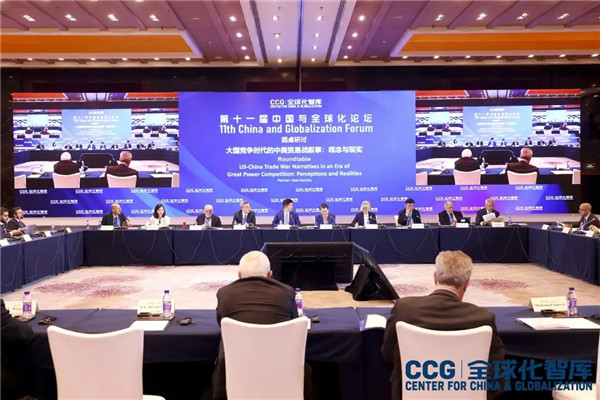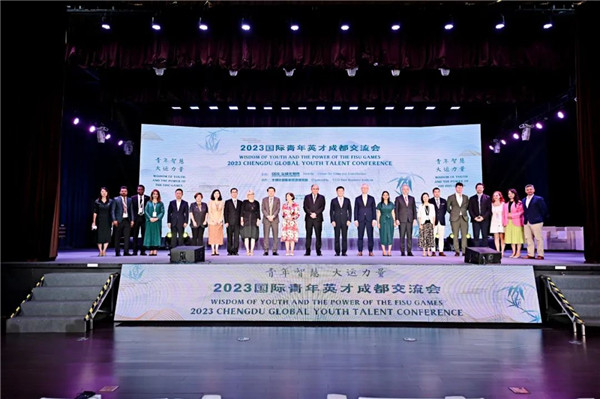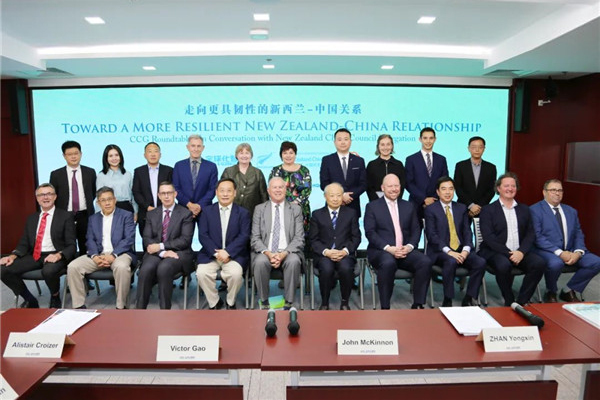Roundtable held to discuss the reform of WTO
On August 23, CCG held a roundtable Dialogue on WTO Modernization in Beijing with leading Swiss think tank Center for International Trade and Sustainable Development (ICTSD) to discuss emerging and existing issues relative to WTO and with major focus on Trade war between the world two biggest economies, America and China as well as developing countries. The dialogue put forth an insightful exchange of thoughts between experts from CCG/UIBE, ICTSD, and other invited experts from China, embassies and global companies. It was a great opportunity on exchange of ideas and possible ways forward to improving a world trade system that is balanced for both developed and developing countries and amicable remedies to resolve the trade dispute between the two largest economies in the world.
Making opening remarks, Amb. Sun Zhenyu, Chairman of China Society for WTO studies, disclosed that global trade war is a dysfunctional and much complicated issue even holding talks and stressed that EU, USA only have reform discussion among themselves. He emphasized that the reform process should include both developed and developing countries. In his assertion, CCG is a very important and highly professional think thank institution focused on corporate governance, international relations, and trade related issues and lamented that WTO has been going through serious threat considering the past 70 years and should be questioned for their actions. The former Ambassador to WTO suggested these critical points:
- WTO should bear in mind the purpose of reform, threat of unilateralism, protectionism and its fundamental rights and discipline must be preserved.
- National security system will have to be very careful against the abuse of so called nation security and China now faces a deficit about 30 billion in service trade.
- According to the former Ambassador to WTO, the present task is to try prevent paralyze the system in Geneva, judges and need some pressure on them. Moreover, many proposals on the settlement of how to prevent judges making ruling out of this whole existing regulation enter into the vacuum and ruling sometimes take long.
- Functions of new negotiations not working at all; investment facilities, E-commerce a big disappointment in helping developing countries.
- Ensure future decision making mechanism and process at WTO should be democratic and meet the general consensus of all parties and must have an executive board
- And that every member has their concerns; encourage the transfer of technology to benefit the whole world.
- He said the rules of WTO were written by the USA and creates imbalance for developing countries and must desist from the banning of technology transfer. These were the former Ambassador’s impression about the trade issue.
The CEO of ICTSD, Ricardo Melendez-Ortiz in his remarks highlighted concerns put forth by the former Ambassador by assuring that focus will be high on WTO modernization and was very excited and optimistic seeing a shake-up in the system. The CEO said WTO has been in existence since 1960. He furthered that the past two years have seen not just monopolistic but also big trade tension between China and the USA. Besides, the world has moved into global production, investment, trade and that WTO will play different roles in the future. Moving forward, below are some of the problems that will be carefully attended by WTO:
- WTO modernization
- Systematic updating of rules
- Working to address the trade tension between the USA and China and WTO using economic model in different ways to settle the issues
- He assured that National agenda on reforms will include developing economies and process of economic reforms
- The CEO promised WTO will respond to current realities of the 21st century and review its framework
- The issues related to digital economy and climate change were considered by him as major priorities to WTO
Major discussion points, comments/questions recorded from the dialogue:
Adam, a representative from the American business in china consented from the former ambassador’s perspective that subsidy, transparency; Intellectual Property Rights have all been in existence except the Trump’s recent actions. He admired the question of what kind of WTO we want; prescriptive or descriptive. He continued that WTO has been in existence for China and the rest of the world and should address the five issues proposed by the former Ambassador of China to WTO. On the other hand, roundtable attendees questioned on how to realize the reform and achieve to achieve desired goals. Responding to the question on the roundtable, is to design a roadmap to carryout reform; setting timetable to decide which area to do the reform, short, medium, long term and possible mechanisms to implement the reform. Moving forward, G20 could also build WTO reform and would play a greater role when it comes to coordination.
Former Ambassador of China to WTO commented that the USA is a key member to WTO and should lead by example. He emphatically clarified that national security means cyber or space security and regrettably sees this attempt as an abuse to developing countries. He argued that WTO must resolve disputes and build consensus on the appointment of its members.
In furtherance, Senior Researcher, Institute of World Economics and Politics, Chinese Academy of Social Sciences, SU Qinqyi emphasized on the financial and economic crisis in the 1980s, 1990s and said he feels inferior with current debate of tariffs with China and USA. The Senior Researcher furthered that international trade and development may have a setback with trade crisis. He conceded that you can’t fight war with trade deficit and same time can’t provide extreme trade policy to destroy the institution but rather should build constructive consensus to harmonizing the trade war. According to him, except world economy before, the current world economy is globalized and linked and considers WTO as a very vital institution to improve trade rules that benefit both developing and developed countries.
The Senior Researcher made these suggestions:
- Encourage proletariat negotiations into the multilateral agreement
- How to design a proletariat approach in the WTO? China should respond positively to the EU, USA; restore the legality of no actionable subsidies; subsidies should be negotiated on a proletariat basis with relevant parties involved; and WTO shouldn’t have any specific rule requiring country to be a market economy
Comments/Questions by some experts:
- How China and other developing countries should reform their SOEs to make it more commercial?
- WTO needs should be development driven in line with SDGs, adaptive, effective and efficient. Many developing countries are deeply frustrated with the reforms process
- Technology transfer to developing countries and productivity gap widening between developed and developing countries and free trade should include free flow of technology to promote development.
- WTO should provide agricultural subsidies to developing countries. For example, USA and EU agriculture subsidies account for about 70 percent of its budget
- National security is very imperative and the rules enshrined in WTO are not development focused with respect to developing countries.
Final responses and closing remarks by the CEO of ICTSD:
He urged China to be very proactive within WTO. In his conclusion, the CEO disclosed that the meeting on modernization of WTO is first of its kind and was glad to be part of the discussion. The Editor of UIBE asked about the purpose of the reform and its system being balanced. He also argued about the absence of developing countries while only china being present maybe mainly the trade battle with USA. The CEO said WTO system will have to be complemented with other global system; China should work towards the convergence of ASEAN and DPRK peninsula; accreditation of WTO with so much relevance and more powerful; and for agriculture subsidies, there has been ongoing discussion and no agreement reached so far.
Sun Yongfu, former Director of European Department of the Chinese Ministry of Commerce , finally, concluded the meeting with strong emphasis that we don’t have to be too optimistic but it’s in the best interest of us all to remain constructive and find the most appropriate remedy.





